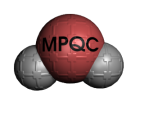Awesome
Synopsis

The Massively Parallel Quantum Chemistry (MPQC) platform is a research package for ab initio simulation of the electronic structure of molecules and periodic solids. The current (4th) version of the package, sometimes referred to as MPQC4, is a modern reenvisioning of the conceptual design of the original MPQC platform using the massively-parallel tensor framework TiledArray, distributed task-based programming model and runtime MADWorld, and the Gaussian integrals library Libint.
Developers
MPQC is developed by the Valeev Group at Virginia Tech.
License
MPQC is freely available under the terms of the GPL v3+ licence. See the the included LICENSE file for details. If you are interested in using MPQC under different licensing terms, please contact us.
How to Cite
See the CITATION file for the recommended citation.
The development of electronic structure methods in MPQC is partially described in the following publications:
- Cannada A. Lewis , Justus A. Calvin , and Edward F. Valeev, "Clustered Low-Rank Tensor Format: Introduction and Application to Fast Construction of Hartree-Fock Exchange.", J. Chem. Theor. Comp., DOI 10.1021/acs.jctc.6b00884;
- Chong Peng, Justus A. Calvin, Fabijan Pavosevic, Jinmei Zhang, and Edward F. Valeev, "Massively Parallel Implementation of Explicitly Correlated Coupled-Cluster Singles and Doubles Using TiledArray Framework.", J. Phys. Chem. A, DOI 10.1021/acs.jpca.6b10150.
Performance
Excellent strong scaling performance of the electronic structure methods in MPQC is demonstrated below for the coupled-cluster singles and doubles (CCSD) wave function solver. Parallel speed-up of 1 iteration of CCSD solver for uracil trimer in 6-31G* AO basis was measured on "BlueRidge" cluster at Virginia Tech (wall time on 1 16-core node = 1290 sec):

This figure was obtained with the help of an allocation from Advanced Research Computing at Virginia Tech.
Acknowledgements
Development of MPQC and its key components is made possible by past and present contributions from the National Science Foundation (awards CHE-0847295, CHE-0741927, OCI-1047696, CHE-1362655, ACI-1450262, and ACI-1550456), the Alfred P. Sloan Foundation, the Camille and Henry Dreyfus Foundation, the Department of Energy Exascale Computing Project (NWChemEx subproject), and the Department of Energy INCITE Program.